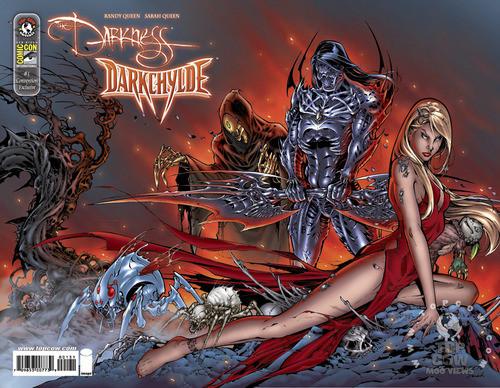I think I have a problem, dear readers. My problem is that Techdirt, one of my favorite websites, keeps bringing me bad news… and I suspect that Techdirt is one of my favorite websites precisely because it keeps bringing me bad news. Well, in case you suffer from the same malady, here’s the bad news.
First, a bit of background. There’s this website called Escher Girls, dedicated to pointing out the ridiculous ways women get portrayed in comics. The name is a reference to M.C. Escher, famous sketcher of twisty structures and impossible building. The implication is that the way these women are drawn is obviously impossible, and that their bodies would have to twist and warp like an Escher building to hold those poses. And when you look at the actual images being criticized…

…I think it’s a fair criticism, and a well-chosen title.
But some people don’t like having their work criticized, which brings me to the bad news. A certain Randy Queen, creator of Darkchylde, didn’t like the treatment he was getting from Escher Girls, and he decided he was going to do something about it. Specifically, he was going to force the site to take down his pictures and stop making fun of them. And thanks to the DMCA, he had the power to do so! And that’s how this happened:
So yesterday I found out that Randy Queen (artist of DarkChylde) filed a bunch of DMCA takedown notices to Tumblr to remove posts of his covers on this blog (the entire posts, not just the images). I’ve also gotten messages from other users that he’s had their stuff removed too (redraws, etc that have been featured here). Non-critical Tumblr posts of his art/covers and those praising his work appear to be unaffected.
DMCA takedowns, oh how I hate them. The world would be better off without the DMCA, and I for one pledge to never use it. But Randy Queen sees nothing wrong with using it, even against people who aren’t “pirating” his work in any way, just poking fun at it. And if that were all that Randy did, I’d still be mad at him. But he didn’t stop there, oh no. He decided to get personal:
Dear Eschergirls and Kim,
I would encourage you to put a stop to all of this. I have no problem getting legal involved for defamation, and for your various allegations on your takedown notice thread, and am happy to send a formal cease and desist letter from my lawyer.
Instead of simply removing the content you do not have the right to electronically distribute, you wish to push further, and publicly challenges my right to protect the perception of my IP as it exists today.
At this point, I will ask you to please move along, as no good will come of this.
Additionally, instead of taking shots at art someone did 18 years ago while they were still learning – which are no longer representative of their current art style or direction for their character – I encourage you to spend your time and energy on creating your own characters and comics which you can make your own personal sacrifices to bring to the world.
Sincerely,
~R
Randy wasn’t satisfied with taking down the posts making fun of him. He decided to take down the post talking about the posts making fun of him. After all, we peons have no right to sully the “perception of [his] IP”, now, do we? We must honor his “personal sacrifices” and refrain from “taking shots”, musn’t we? Move along now, before Randy gets mad and this gets ugly.
Well, I’m not moving anywhere. I don’t like it when people pick on blogs I like, I really don’t like it when people use the DMCA, I really really don’t like it when people threaten to sue someone for criticizing them, and I just hate it when someone does all of these things at the same time. I’m not going to keep quiet about this.
Randy Queen, hear this: the way you draw women makes me wonder if you hate them, and the way you handle criticism makes me want to hate you. The folks at Escher Girls were well within their rights (their legally recognized rights, no less!) to make fun of your work, and your artwork deserves to be made fun of, and if you think you have any special right to “protect the perception of [your] work”, you’re not just wrong, you’re a fool! You’ve abused our legal system, taken away other people’s rights, and made the world a slightly worse place. You owe Ami and everyone else an apology. Grow up, and let people mock your comics in peace.
But I don’t actually expect Randy to wise up any time soon. While I was writing this post, I got more bad news, this time from this post at Popehat. Randy’s now throwing accusations of “harassment” and “character assassination”, and he continues to urge us all to draw our own pictures instead of making fun of his, and also to think of people and animals suffering and dying in the world, and real human rights issues in certain countries (no, really, that’s what he said, go read the letter). Well, guess what, Queen: free speech is a human right, and censorship is a real human rights issue, and you’re censoring. Quit it.
For the sake of preservation, here’s one of the images that Randy ordered Ami to take down:

And here’s what Ami said in the now deleted post:
One leg is twice as long as the other.
On the other hand, this looks like the best prom ever.
And there’s what Randy is trying to censor. Not this time, Mr. Queen. Not this time.